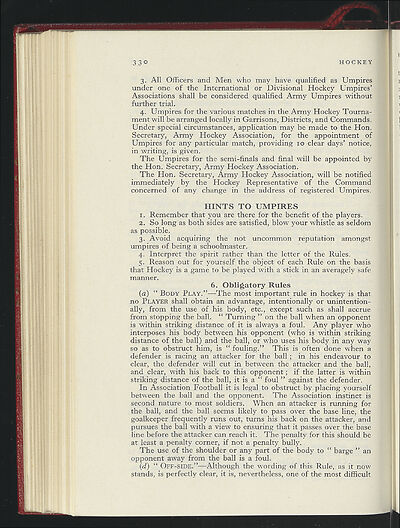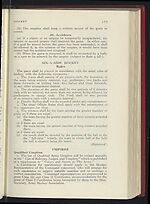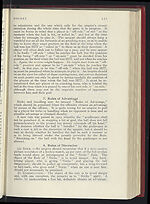1938-39
(356)
Download files
Complete book:
Individual page:
Thumbnail gallery: Grid view | List view

F.
330
HOCKEY
t
3. All Officers and Men who may have qualified as Umpires
under one of the International or Divisional Hockey Umpires'
Associations shall be considered qualified Army Umpires without
further trial.
4. Umpires for the various matches in the Army Hockey Tourna-
ment will be arranged locally in Garrisons, Districts, and Commands.
Under special circumstances, application may be made to the Hon.
Secretary, Army Hockey Association, for the appointment of
Umpires for any particular match, providing io clear days' notice,
in writing, is given.
The Umpires for the semi-finals and final will be appointed by
the Hon. Secretary, Army Hockey Association.
The Hon. Secretary, Army Hockey Association, will be notified
immediately by the Hockey Representative of the Command
concerned of any change in the address of registered Umpires.
HINTS TO UMPIRES
i. Remember that you are there for the benefit of the players.
2.
So long as both sides are satisfied, blow your whistle as seldom
as possible.
3. Avoid acquiring the not uncommon reputation amongst
umpires of being a schoolmaster.
4. Interpret the spirit rather than the letter of the Rules.
5. Reason out for yourself the object of each Rule on the basis
that Hockey is a game to be played with a stick in an averagely safe
manner.
6. Obligatory Rules
(a) "
B
O
D
Y
P
LAY."
—The most important rule in hockey is that
no
P
LAYER
shall obtain an advantage, intentionally or unintention-
ally, from the use of his body, etc., except such as shall accrue
from stopping the ball. " Turning " on the ball when an opponent
is within striking distance of it is always a foul. Any player who
interposes his body between his opponent (who is within striking
distance of the ball) and the ball, or who uses his body in any way
so as to obstruct him, is " fouling." This is often done when a
defender is racing an attacker for the ball ; in his endeavour to
clear, the defender will cut in between the attacker and the ball,
and clear, with his back to this opponent ; if the latter is within
striking distance of the ball, it is a " foul " against the defender.
In Association Football it is legal to obstruct by placing yourself
between the ball and the opponent. The Association instinct is
second nature to most soldiers. When an attacker is running for
the ball, and the ball seems likely to pass over the base line, the
goalkeeper frequently runs out, turns his back on the attacker, and
pursues the ball with a view to ensuring that it passes over the base
line before the attacker can reach it. The penalty for this should be
at least a penalty corner, if not a penalty bully.
The use of the shoulder or any part of the body to " barge " an
opponent away from the ball is a foul.
(d) "
O
FF-SIDE.
"—Although the wording of this Rule, as it now
stands, is perfectly clear, it is, nevertheless, one
of
the most difficult
330
HOCKEY
t
3. All Officers and Men who may have qualified as Umpires
under one of the International or Divisional Hockey Umpires'
Associations shall be considered qualified Army Umpires without
further trial.
4. Umpires for the various matches in the Army Hockey Tourna-
ment will be arranged locally in Garrisons, Districts, and Commands.
Under special circumstances, application may be made to the Hon.
Secretary, Army Hockey Association, for the appointment of
Umpires for any particular match, providing io clear days' notice,
in writing, is given.
The Umpires for the semi-finals and final will be appointed by
the Hon. Secretary, Army Hockey Association.
The Hon. Secretary, Army Hockey Association, will be notified
immediately by the Hockey Representative of the Command
concerned of any change in the address of registered Umpires.
HINTS TO UMPIRES
i. Remember that you are there for the benefit of the players.
2.
So long as both sides are satisfied, blow your whistle as seldom
as possible.
3. Avoid acquiring the not uncommon reputation amongst
umpires of being a schoolmaster.
4. Interpret the spirit rather than the letter of the Rules.
5. Reason out for yourself the object of each Rule on the basis
that Hockey is a game to be played with a stick in an averagely safe
manner.
6. Obligatory Rules
(a) "
B
O
D
Y
P
LAY."
—The most important rule in hockey is that
no
P
LAYER
shall obtain an advantage, intentionally or unintention-
ally, from the use of his body, etc., except such as shall accrue
from stopping the ball. " Turning " on the ball when an opponent
is within striking distance of it is always a foul. Any player who
interposes his body between his opponent (who is within striking
distance of the ball) and the ball, or who uses his body in any way
so as to obstruct him, is " fouling." This is often done when a
defender is racing an attacker for the ball ; in his endeavour to
clear, the defender will cut in between the attacker and the ball,
and clear, with his back to this opponent ; if the latter is within
striking distance of the ball, it is a " foul " against the defender.
In Association Football it is legal to obstruct by placing yourself
between the ball and the opponent. The Association instinct is
second nature to most soldiers. When an attacker is running for
the ball, and the ball seems likely to pass over the base line, the
goalkeeper frequently runs out, turns his back on the attacker, and
pursues the ball with a view to ensuring that it passes over the base
line before the attacker can reach it. The penalty for this should be
at least a penalty corner, if not a penalty bully.
The use of the shoulder or any part of the body to " barge " an
opponent away from the ball is a foul.
(d) "
O
FF-SIDE.
"—Although the wording of this Rule, as it now
stands, is perfectly clear, it is, nevertheless, one
of
the most difficult
Set display mode to:
![]() Universal Viewer |
Universal Viewer | ![]() Mirador |
Large image | Transcription
Mirador |
Large image | Transcription
| Games and sports in the army > 1938-39 > (356) |
|---|
| Permanent URL | https://digital.nls.uk/248741234 |
|---|
| Description | 'Games and Sports in the Army' was an annual publication produced by the British War Office between the 1930s and 1960s. This included the Second World War. It outlines the rules and regulations for games and sports played by members of the armed forces. It features names and photographs of team members, and examples of contemporary advertising. |
|---|---|
| Shelfmark | GWB.52 |

